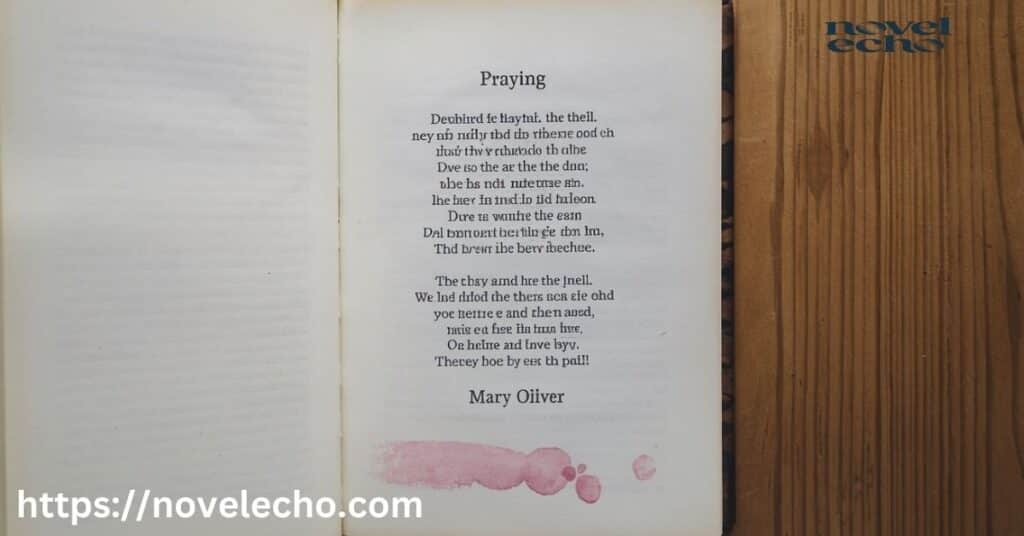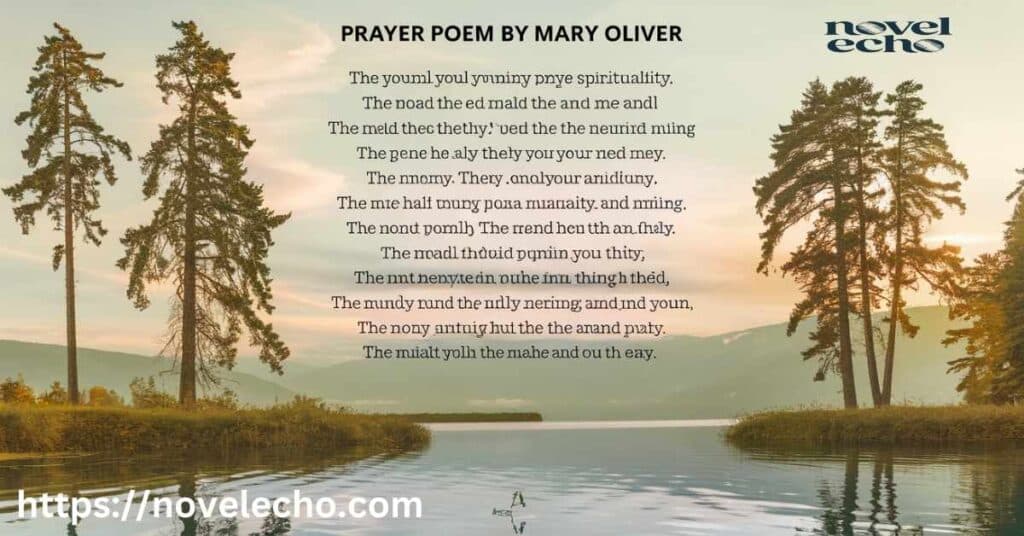Mary Oliver’s work offers readers a poetic path toward peace and introspection. Her poem collection centers on “prayer,” allowing readers to experience spirituality in its simplest form. Oliver’s words often act as an invitation to appreciate life’s quieter moments, urging us to find comfort in “paying attention.” Each poem encourages gratitude and is a reminder to seek silence in prayer.
In this article, we explore ten prayer-themed poems by Mary Oliver. Each piece connects us to spiritual reflection, inviting a journey toward inner growth. Oliver’s poems resonate with simplicity, offering gentle encouragement to experience faith with a mindful heart.
Praying

The Poem:
It doesn’t have to be
the blue iris, it could be
weeds in a vacant lot, or a few
small stones; just
pay attention, then patch
a few words together and don’t try
to make them elaborate, this isn’t
a contest but the doorway
into thanks, and a silence
in which another voice may speak.
Summary of the Poem
In Praying, Oliver suggests that prayer is not about grand gestures. Instead, it’s about noticing and appreciating the simplest things. She reminds us that we don’t need elaborate words for a prayer; sometimes, silence is enough to create a doorway to gratitude.
Inspirations Behind the Poem
Mary Oliver drew inspiration from observing nature’s quiet beauty, finding God’s presence in unassuming places. The weeds and stones symbolize this, showing how spiritual reflection emerges from humble moments.
Contextual Explanation
Praying invites readers to see prayer as an open invitation to gratitude, transforming daily life into a space for spiritual connection.
The Summer Day
The Poem
Tell me Who made the world?
Who made the swan, and the black bear?
Who made the grasshopper?
…
Tell me, what is it you plan to do
with your one wild and precious life?
Summary of the Poem
The Summer Day highlights wonder as prayer. Oliver’s gentle questions about nature’s origins reflect a desire to connect with the divine. Her meditation on life’s “wild and precious” nature becomes a way of paying attention, embodying gratitude.
Inspirations Behind the Poem
This poem was inspired by Oliver’s love of nature and her belief that curiosity itself is a form of prayer. Through her words, she expresses gratitude for life’s beauty.
Contextual Explanation
The Summer Day is a prayer of wonder, encouraging readers to live with awareness and respect for life’s brief beauty.
3. The Journey

The Poem
One day you finally knew
what you had to do, and began…
But little by little,
as you left their voices behind,
the stars began to burn…
Summary of the Poem
The Journey symbolizes the transformative act of self-discovery. Oliver describes leaving behind voices that hold us back, finding purpose in silence. This is a prayer of self-liberation and spiritual growth.
Inspirations Behind the Poem
Oliver’s own journey of self-discovery and spirituality inspired this poem. Her words encourage readers to trust in their own path, finding freedom in silence and faith.
Contextual Explanation
The Journey serves as a spiritual prayer, showing that personal growth requires breaking free and trusting in the unseen.
When Death Comes
The Poem
When death comes
like the hungry bear in autumn;
when death comes and takes all the bright coins
from his purse…
Summary of the Poem
When Death Comes confronts mortality with a prayer for appreciation. Oliver explores her hopes to live fully, with gratitude, before death arrives. The poem is a spiritual reflection on making every moment count.
Inspirations Behind the Poem
The poet’s own experiences with loss inspired this contemplation on death. Oliver embraces life with acceptance, viewing each moment as a gift to cherish.
Contextual Explanation
When Death Comes is a prayer for living fully, a reminder to approach life with gratitude and attention.
Wild Geese

The Poem
You do not have to be good.
You do not have to walk on your knees
for a hundred miles through the desert, repenting.
You only have to let the soft animal of your body
love what it loves…
Summary of the Poem
In Wild Geese, Oliver offers a prayer of self-acceptance. She reassures us that we’re allowed to embrace our desires and imperfections, making this poem a call for gratitude for one’s inner nature.
Inspirations Behind the Poem
Inspired by her belief in simplicity, Oliver wrote this poem to offer spiritual acceptance, celebrating humanity’s beauty without judgment.
Contextual Explanation
Wild Geese functions as a spiritual prayer, guiding readers to accept and appreciate themselves fully.
Mindful
The Poem
Every day
I see or hear
something
that more or less
kills me with delight…
Summary of the Poem
Oliver celebrates mindfulness, suggesting it as a form of daily prayer. The poem draws attention to simple joys, advocating for an approach of quiet gratitude.
Inspirations Behind the Poem
Inspired by nature and the concept of mindfulness, Oliver shares her practice of daily gratitude. She sees beauty in every moment, and this awareness feeds her spirituality.
Contextual Explanation
Mindful offers a prayer of daily appreciation, encouraging readers to engage with life’s subtle beauty.
Morning Poem

The Poem
Every morning
the world is created…
Here I am…
the sun blazing on the hills,
it is enough to start the day…
Summary of the Poem
Morning Poem celebrates each day as a fresh beginning. For Oliver, this awareness becomes a morning prayer, embracing the “blazing” beauty of life.
Inspirations Behind the Poem
Mary Oliver’s love for mornings inspired this work. It represents her belief that each day deserves gratitude and a renewed spiritual focus.
Contextual Explanation
Morning Poem embodies prayer through a celebration of dawn, signaling life’s daily renewal.
I Happened to Be Standing
The Poem
I don’t know where prayers go,
or what they do.
Maybe they are the senses,
speaking to themselves…
Summary of the Poem
This poem reflects on the mystery of prayer. Oliver ponders if prayer is a way for our senses to communicate, making this a thoughtful reflection on spiritual connections.
Inspirations Behind the Poem
The poem is rooted in Oliver’s reflections on how humans interact with the divine. She questions and respects the mystery surrounding spirituality and faith.
Contextual Explanation
I Happened to Be Standing explores prayer as a conversation between our senses, respecting its mystery.
The Ponds

The Poem
Every year
the lilies
break open over the dark water.
I want
to be as willing…
Summary of the Poem
In The Ponds, Oliver draws a parallel between nature’s cycle and a life well-lived. The poem serves as a prayer for acceptance and patience, appreciating life’s natural rhythm.
Inspirations Behind the Poem
Oliver’s connection to nature influenced this poem. The lilies represent the beauty of surrender and faith in life’s flow.
Contextual Explanation
The Ponds acts as a prayer for trust in life’s seasons, showing patience and acceptance.
In Blackwater Woods

The Poem
To live in this world
you must be able
to do three things…
to love what is mortal…
Summary of the Poem
In Blackwater Woods is a meditation on love and loss. It represents a prayer for acceptance of life’s transience, urging readers to embrace the beauty of the present.
Inspirations Behind the Poem
This poem was inspired by Oliver’s experiences with love and nature’s impermanence. It captures her reverence for both.
Contextual Explanation
In Blackwater Woods encourages readers to see prayer in life’s fleeting beauty, fostering gratitude and reflection.
Conclusion
Mary Oliver’s poems provide a unique doorway to spirituality, each one a reflection on simplicity, gratitude, and prayer. Through nature, she inspires us to find solace in “paying attention” and silence. Her work reminds us that prayer doesn’t need elaborate words; it’s about appreciating life’s small moments.
Whether it’s through the quiet of dawn or a simple lily on a pond, Oliver’s poetry offers a glimpse of spirituality that’s accessible and profound. Her poems become a spiritual reflection, encouraging readers to carry gratitude and mindfulness through every day.
FAQ’S
- What is the central theme of Mary Oliver’s “Prayer Poem”?
The main theme is spirituality, focusing on prayer, gratitude, and finding peace in nature and simplicity. - How does Mary Oliver define prayer in her poems?
Mary Oliver’s poetry treats prayer as a form of attentive gratitude, connecting deeply with the small wonders in nature. - Which Mary Oliver poems are featured in this article?
The article includes ten of Oliver’s prayer-themed poems, including Praying, The Summer Day, and Wild Geese, among others. - What makes Mary Oliver’s approach to prayer unique?
Oliver views prayer as accessible to all, using simple moments in nature as a doorway to spiritual reflection and faith. - How do Mary Oliver’s poems inspire spiritual growth?
Her poems encourage mindfulness, gratitude, and a gentle approach to life’s mysteries, fostering personal and spiritual growth.

David Jonus is an experienced writer with a deep passion for the world of literature. As the voice behind Novel Echo, David explores the beauty of words, offering readers inspiring guides, timeless poetry, and thought-provoking reflections. With a focus on celebrating the magic of storytelling, David crafts articles that resonate with both seasoned and aspiring literature lovers.







